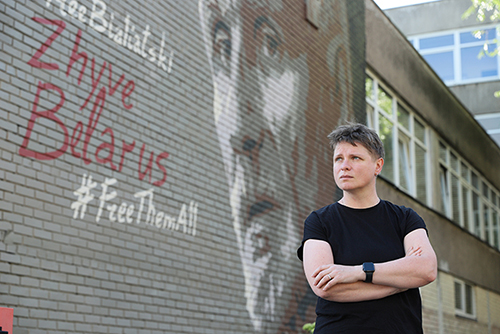This interview was organised by the Barys Zvozskau Belarusian Human Rights House for the third edition of the “Portraits of Strength” photo exhibition. The photo was taken by Tatsiana Ulasenka at the Ales Bialiatski mural, Vilnius, Lithuania, in July 2024.
Listen to this interview in audio format.
Why did you become a human rights defender?
“All my life I was ‘dragged’ into situations where I had to face injustice and resist it. Human rights activities gave me the sense that I could safeguard the territory of dignity.”
“I felt unworthy of being called a human rights defender for a long time because I lacked knowledge, experience, and competencies. However, in July 2020, when I shared my phone number with a new acquaintance, I noticed she saved my contact as ‘Taciana HR defender.’ That simple gesture made me realise I had earned that title.”
What is the nature of your work and what challenges do you face as a Woman Human Rights Defender?
“Our organisation [PEN Belarus] collaborates with writers and, more broadly, cultural figures.”
“We monitor and report on human rights violations within the cultural sphere and cultural rights. We promote human rights principles and establish a system for supporting and developing national culture and literature grounded in these principles.”
Belarusian culture is under the oppression of the state, and is under threat of destruction.
“That is why one of the main tasks of our organisation is to develop Belarusian culture and literature, to help writers. On the other hand, sometimes individuals who had made significant sacrifices for Belarusian culture – those who became national heroes – may not fully grasp human rights principles. As a result, we, as a human rights organisation cannot support their actions. We must carefully choose our words and assessments to both recognise and honour merits while also addressing problem areas.”
What kind of human rights situation in your country would you like to see in the next 30 years?
“Human dignity should be a fundamental value embedded throughout the education system, from kindergarten through university.”
“Both education and upbringing should be centred around this principle. The same approach should be applied within the penitentiary system.”
Human rights values should be integrated across all activities of both governmental and non-governmental organisations.
What is the current human rights situation in your country?
“I’d like to respond with a poem:
[By Taciana Niadbaj; translated from Belarusian to English by John Farndon, Jenya Mironava, #FreeAllWords]
“(2020-2023)
Detained and released without report
Good it was just three days, not a fine
Good there was no beating
Good it was a fine, not 24 hours
Good it was 24 hours, but at least with a mattress
Good it was 15 days, but not 30
Good there was no beating
Good it was straight 90 days, not criminal
Good it was a criminal case, no beatings
Good it was home chemistry, not chemistry [1]
Good it was chemistry, not years in prison
Good it was 2 or 3 years, not ten
Good it was in SIZA[2] , not in a colony
Good it was a colony of the general regime, not the intensified[3]
Good there were letters, though it was the intensified
Good it was in a colony, not in PKT[4]
Good it was in PKT, not in ŠYZA[5]
Good it was in ŠYZA, but healthy
Beaten up, but at least healthy
Good if that he got out, now planning treatment
Still in prison, but at least alive
I pray only that he gets out alive”
[1] Chemistry” ~ a common sentence: imprisonment (restricted freedom) in an open-type correctional facility + hard labour. “Home chemistry” when the sentence includes the wording „without being sent to an open-type correctional facility.“ Your freedom is still restricted and you still have to do hard labour, but you are at home, although under police watch.
[2] SIZA – an infamous abbreviation for a “pretrial detention centre,” where one is imprisoned while investigation goes on.
[3] Corrective colony regimes are categorised as very strict/special, strict, general, and open” but according to Radio Svaboda, there are colonies of “general, intensified, and strict regime” in Belarus.
[4] PKT, an abbreviation for a “cell-type space/room/premises/ward.” This is usually a space in a colony where one is sent for violating internal order, rules. One can be kept there for up to 6 months.
[5] ŠYZA, an abbreviation for “fine/penalty
Can you describe your motivation to be a human rights defender?
For me, human rights are like seatbelts that minimise harm to yourself and others should an emergency occur. Emergencies like crises, turbulence, or wars very often become an excuse to renounce human rights and a reason to question their value.

About Portraits of Strength
Women human rights defenders (WHRDs) work to protect and advance freedoms while facing discrimination and stereotypes about their role and participation in society.
HRHF seeks to honour and promote independent women human rights defenders and their work through the “Portraits of Strength: Women Defending Human Rights” photo exhibition and highlight the human rights situation in the countries of the Network of Human Rights Houses.
The exhibition, now in its third edition, shares portraits and stories from WHRDs working on a variety of issues including the documentation of human rights violations and alleged war crimes, rule of law, women’s rights, political prisoners, freedom of expression, and more.
Find out more here.





